|
|
|
Sort Order |
|
|
|
Items / Page
|
|
|
|
|
|
|
| Srl | Item |
| 1 |
ID:
169043
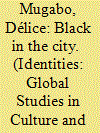

|
|
|
|
|
| Summary/Abstract |
Montreal, a city delimited by a French-speaking East and an English-speaking West, is often used as an example of how language can organize urban landscapes. That said, examining Black life in Montreal complicates that tidy narrative by illustrating how race, not language, configures the city. Broadly, this study examines the way racial and linguistic divisions play out in the geography of the city. More specifically, as it is grounded in Black geography and cultural geography, this paper highlights how Black activists in the 1990s made explicit the many ways in which Blackness in Montreal was rooted in a history and a geography that exceeds urban and national boundaries. Contesting an ethnicization that marked their Haitianness as outside Blackness, these activists also bridged smaller-scale divisions: those inscribed at the scale of the city that placed Haitians in the East and Black anglophone people in the West.
|
|
|
|
|
|
|
|
|
|
|
|
|
|
|
|
| 2 |
ID:
169048
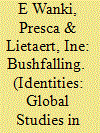

|
|
|
|
|
| Summary/Abstract |
Educational mobility in Cameroon is not a recent phenomenon, yet through the notion of ‘bushfalling’ – that is, the way international migration is envisioned and constructed in Cameroon – young Cameroonians explore routes to new destination countries for educational migration as a way of fulfilling their dreams of a better future. These dreams are enabled and challenged by the different role identities the students have to combine in the destination country. This article focuses on self-sponsored Anglophone Cameroonian students in Flanders, who combine roles as students, workers and transnational caregivers. Using bushfalling as our analytical lens, we explore the change in understanding bushfalling through the educational route and its implications for transnational family relations. Further, we explore the various ways in which these students negotiate and manipulate the different roles, yet keep the student role identity in the centre, and how this in turn informs their next step in the education-migration trajectory.
|
|
|
|
|
|
|
|
|
|
|
|
|
|
|
|
| 3 |
ID:
169047
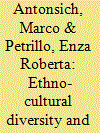

|
|
|
|
|
| Summary/Abstract |
Migration is often said, in the public discourse, to pose a threat to the nation. Yet, Western societies are undergoing an irreversible demographic change spurred in great part by international migration. Thus, the question about how to reconcile nation and diversity remains of crucial importance for many countries. By focusing on the case of Italy, the article attends to this issue, by exploring the response of leftist political parties. We analyse parliamentary debates and laws related to immigration and integration issues (1986–2014), focusing specifically on the Turco-Napolitano Law (1998), possibly the most progressive legislative attempt at incorporating migrants into the Italian nation. Our analysis shows a clear incongruence between the pluralist rhetoric of the political left and its legislative acts on migrants’ national incorporation. This finding is used to reflect on the limits and possibilities of the very idea of inclusive nation in the age of migration.
|
|
|
|
|
|
|
|
|
|
|
|
|
|
|
|
| 4 |
ID:
169045
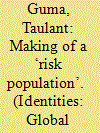

|
|
|
|
|
| Summary/Abstract |
This paper critically examines the processes of categorisation of Roma migrants in Glasgow, contributing to debates on the (unsuccessful) attempts of the EU and individual European states to tackle the social exclusion of various Roma populations living in Europe. Hitherto little attention has been paid to how measures aimed at improving the lives of Roma actually ‘work’ in practice, especially in the context of more recent Roma migration within Europe. Moreover, the role that ethnicity plays ‘on the ground’ has often been overlooked or taken for granted in the relevant literature. Based on 12 months of ethnographic fieldwork with Czech- and Slovak-speaking migrants, including Roma, in Glasgow in 2012, this paper aims to address this gap in the literature. Adopting a boundary-making perspective on ethnicity to analyse interactions in institutionalised settings, it traces and discusses various practices through which ‘the Roma’ were constructed as ‘a risk population’ in the city.
|
|
|
|
|
|
|
|
|
|
|
|
|
|
|
|
| 5 |
ID:
169044


|
|
|
|
|
| Summary/Abstract |
This article explores the ‘return’ migration of high-skilled, second-generation Indian-Americans from the United States to India. Based on interviews with fifty-six respondents, it asks: What transnational ties do second-generation Indian Americans maintain with India prior to return? Upon return, what are their ‘reverse’ transnational linkages to the United States? How do these linkages shape their ethnic identities, if at all? Findings suggest that respondents’ transnational ties to India prior to return reinforce their identities as Indian Americans. Once in India, they maintain affective and civic ties to the United States, the country where they were born or raised. Further, American-inflected social ideas and norms shape returnees’ interactions with domestic workers in India. As they grapple with the disparities between Western and Indian norms on the treatment of domestic help, respondents privilege ‘American’ identities. These findings highlight the transnational ties and identity construction and negotiation of second-generation returnees.
|
|
|
|
|
|
|
|
|
|
|
|
|
|
|
|
| 6 |
ID:
169046
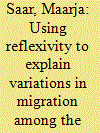

|
|
|
|
|
| Summary/Abstract |
Migration literature has traditionally distinguished between different motivations of migration, such as labour, family and newly also lifestyle migration, never fully exploring the background of these motivations. This article suggests that these different motivations may be explained by different modes of reflexivity as distinguished by Margaret Archer. Linking modes of reflexivity with migration motivations addresses two problems in current migration literature. First, it provides for practical application of reflexivity in explaining migration motivations, which has been missing so far. Second, the article advocates using psycho-social approach as opposed to more commonly adapted ethnical or class based explanations in understanding migration behavior, hence avoiding the potential trap of falling into the trap of methodological nationalism or classism. Through the interview with highly-skilled Estonian migrants it is shown that the reasons of migration among highly skilled are versatile and cannot be explained solely by their class background.
|
|
|
|
|
|
|
|
|
|
|
|
|
|
|
|
|
|
|
|
|